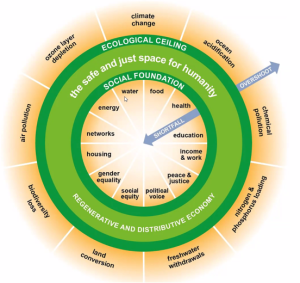On 27th September, HMC colleagues Dr Kofi Ansong, Georgina Roberts, Dr Lydia Koehler and Kimberley Lloyd attended the ‘Your Essentials of Conservation Social Science’ course led by Rebecca Jefferson at Human Nature. Recognising the pivotal role of comprehending the human dimension of environmental issues, this course aimed to understand the scope and purpose of conservation social science (Bennett et al., 2017). The goal was to shed light on how social science disciplines can significantly influence conservation policies, actions, and outcomes, aligning with a broader vision of promoting both ecologically effective and socially equitable conservation (Bennett et al., 2016).
We embraced the idea of integrating social science into our core practices. By enhancing our knowledge of its scope and contributions, we envisioned a future where it seamlessly informs our research, engages various sectors, and drives policy decisions. The Doughnut Economic Model by Raworth (2018) brilliantly highlights the interconnectedness of humanity’s needs and ecological limits, offering a regenerative approach for a sustainable economy that addresses both social inequalities and environmental degradation (Figure 1).

Figure 1 Doughnut Economic Model (Raworth, 2018)
In today’s project landscape, sustainable development stands as a cornerstone principle, prominently featuring social equality and environmental conservation as pivotal objectives. Yet, despite this consciousness, there appears to be a noticeable lag in proactive momentum or a comprehensive understanding of how we can holistically attain these goals. This is precisely where harnessing the power of social science methods can make a transformative difference.
These methods can be powerful tools to understand human behaviour, societal attitudes, and policy implications, laying the foundation for effective strategies to holistically address environmental challenges. While surveys, questionnaires, interviews, and case studies were already part of our toolkit, we delved deeper into other invaluable techniques like behavioural analysis and social network analysis.
Georgina Roberts, who is deeply involved in various engagements with the sector, regularly connects with these stakeholders and the wider fishing community. Her work aims to understand the relationships and interactions between stakeholders, which in turn informs the development of community-based fisheries management approaches. Incorporating local knowledge and practices of fishing communities into management strategies is essential for policymakers, offering unique insights and fostering a sense of ownership and collaboration for fisheries stakeholders, ultimately supporting livelihoods and local communities. Georgina is currently leveraging social science in an ongoing fisheries project that investigates the interaction between different fisheries sectors and stakeholders and how this can best be supported.
As an ECOWind champion team member, Kimberley Lloyd uses social network analysis to unravel relationships and interactions in the ECOWind program, revealing collaboration dynamics and dissemination patterns (Figure 2). The graphical representation showcased stakeholder interplay between academia (orange), industry (green), and government (blue). Each programme had unique clusters as well as multiple connections across a broad level of engagement. Whilst not drawn using statistical measurements, this graph provides valuable insights into the evolving stakeholder engagement in ECOWind. Moving forward, we anticipate a continued growth in connections and collaborations. For more information on the social network analysis, visit: Mitchel Centre – Social Network Analysis

Figure 2 Social Network Analysis ECOWind Example
Kofi Ansong will use scenario building methodologies to engage coastal stakeholders within HMC’s upcoming Kenya Land Sea Planning project. The project seeks to develop Kenya Land Sea Planning guidance for the Jumuiya ya Kaunti za Pwani (JKP, Kenya’s Coastal Counties Economic Bloc). The scenario building approach will support engagement with stakeholder to craft narratives about different futures and ideal cases of integration between land and marine planning systems in Kenya. This approach will help understand the challenges of institutional working between land planners and marine planners and develop visions and actions to address key barriers. Kofi will support other partners within the project to apply a stakeholder network analysis to understand how key stakeholder interact across the land sea interface and how to improve coordination for decision making.
Lydia Koehler’s work ranges across sectors and disciplines with a specific focus on policy development and implementation. She uses social science to create open dialogues with stakeholders in the marine environment, which includes better stakeholder survey design, improved workshop approaches, and opening future HMC projects to new and alternative methods of social science, such as interactive plays, direct dialogues, and storytelling. These will help her to support a variety of projects, including upcoming work with the fishing community.
HMC is committed to incorporating social science methodologies into our core practices and remain dedicated to pushing the boundaries of what is possible in the name of a more sustainable and equitable future.
